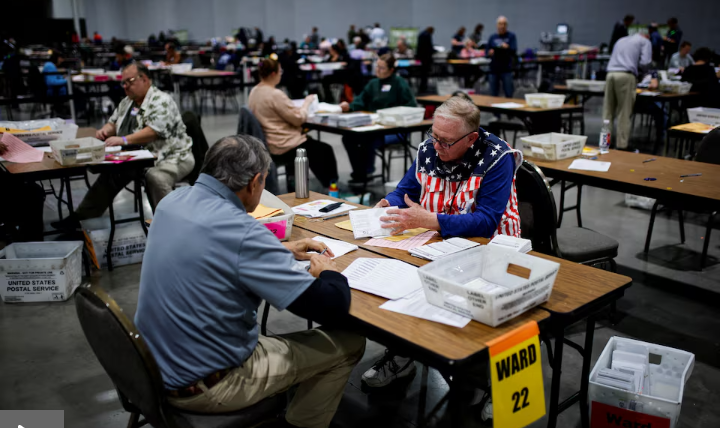ATLANTA (Reuters): Republican Donald Trump won 15 states in Tuesday’s U.S. presidential election while Democrat Kamala Harris captured seven states and Washington, D.C., Edison Research projected, but the contest remained undecided with critical battleground states unlikely to be called for hours or even days.
The early results were as anticipated, with the contest expected to come down to seven swing states: Arizona, Georgia, Michigan, Nevada, North Carolina, Pennsylvania and Wisconsin. Opinion polls showed the rivals neck and neck in all seven going into Election Day.
As of 9:30 p.m. ET (0230 GMT on Wednesday), polls had closed in 41 states and Washington, D.C. Trump had 162 electoral votes to Harris’ 81 electoral votes, but both still had multiple paths to victory. A candidate needs a total of 270 votes in the state-by-state Electoral College to claim the presidency.
Decision Desk HQ projected Trump would win North Carolina, but other media outlets and Edison had yet to call the race.
In Georgia, Trump had opened up a 52.3% to 47.1% lead with 77% percent of the estimated vote tallied, according to Edison.
Control of both chambers of Congress is also up for grabs. Democrats had only a narrow path to defend their Senate majority after Republican Jim Justice flipped a West Virginia seat on Tuesday. The House of Representatives looked like a toss-up.
In Florida, a ballot measure that would have guaranteed abortion rights failed to reach the 60% threshold needed to pass, according to Edison, leaving a six-week ban in place. Nine other states have abortion-related measures on the ballot.
Nearly three-quarters of voters say American democracy is under threat, according to national exit polls from Edison, underscoring the depth of polarization in a nation where divisions have only grown starker during a fiercely competitive race.
Trump employed increasingly apocalyptic rhetoric while stoking unfounded fears that the election system cannot be trusted. Harris warned that a second Trump term would threaten the underpinnings of American democracy.


Comments are closed.